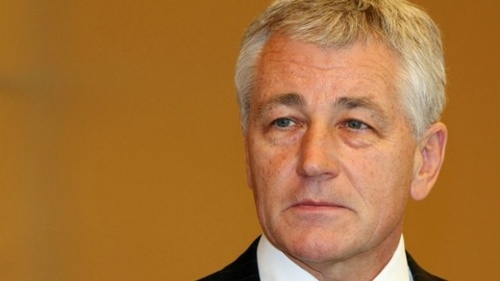
“Chuck Hagel is out of the mainstream of thinking … on most issues regarding foreign policy,” says GOP Sen. Lindsey Graham. Neocon William Kristol concurs: Hagel is “out on the fringes.”
But where, exactly, is the mainstream on foreign policy in 2013?
Since the Bush II years, “the three amigos” — Sens. Graham, John McCain and Joe Lieberman — have clamored for new wars.
“We are all Georgians now!” thundered McCain when Vladimir Putin was thrashing the Georgians for attacking South Ossetia.
“Bomb, bomb, bomb — bomb, bomb Iran,” trilled McCain in 2008 in parody of the Beach Boys’ “Barbara Ann.”
Ten days ago, McCain, Graham and Lieberman urged the U.S. to impose a no-fly zone over Syria, provide weapons to the rebels and send Patriot missile batteries to protect northern Syria. And what has been the response to their calls for air strikes and new wars? The sound of silence.
George W. Bush ignored McCain on Georgia, and in 2008 McCain was crushed by a dovish Democrat who had opposed the Iraq War.
Like Hagel, who voted for the Iraq War, a majority of Americans have come to believe that 8-year war was a mistake. Even some neocons have expressed second thoughts.
Obama pulled all U.S. troops out of Iraq and is pulling them out of Afghanistan, and he won easy re-election over the more hawkish Mitt Romney. And has anyone heard any echo of the amigos’ call to plunge into Syria’s civil war, outside the editorial pages of The Washington Post and The Wall Street Journal, and the little magazines of the neocons?
Let’s do our nation-building here at home, Obama said in the debates.
Any doubt this idea had been poll-tested as a winner?
How many Americans today are saying that what we did in Libya, Iraq and Afghanistan was worth doing and should serve as America’s model for dealing with Syria and Iran?
From 2001 to 2005, McCain, Graham and Lieberman were in the mainstream. Those were the days of bipartisan votes for war, of “either you are with us, or you are with the terrorists,” of our goal being “to end tyranny in our world.” Those were the days of the democracy crusade of George W. Bush.
But that was yesterday. The crusade is over. Americans want the crusaders home.
This is not an argument for mindlessly seeking out and parroting mainstream thought. If the amigos believe that intervening in Syria and war with Iran are essential to the national security, they should continue to say so.
Nothing wrong with being out of step with majority opinion, if that is where one believes that truth and wisdom lie.
But the amigos and neocons deceive themselves if they think that in their hostility to Hagel’s views they occupy the mainstream.
Set aside the nonsense about homophobia and anti-Semitism. What, at bottom, are Hagel’s views? Where does he part company with much of the Senate GOP? What are the substantive disagreements?
First, Hagel believes in direct communication with our enemies, be it Hezbollah, Hamas, Iran or Cuba. Second, he believes war is a last resort to be undertaken only after all diplomacy has failed, and war should not be undertaken unless vital interests are imperiled.
Third, he believes a Pentagon budget as large as all the defense budgets of the other 190 nations combined is bloated and too big to carry when, as Chairman of the Joint Chiefs Adm. Mike Mullen said, the deficit and debt are the greatest strategic threats to the United States.
On communicating with enemies, was Richard Nixon, who rescued Israel in the Yom Kippur War, wrong to go to Egypt and Syria, and meet with Anwar Sadat and Hafez Assad, who had launched the war?
Was Yitzhak Rabin wrong to negotiate with Yasser Arafat, his enemy, to achieve the Oslo Accords? Was Bibi Netanyahu wrong to give Hebron to Arafat or deal with Hamas for the return of Pvt. Gilad Shalit, in exchange for 1,000 Palestinian prisoners?
Was it not absurd that, to get a ceasefire between Hamas and Israel, both parties had to go to Hosni Mubarak, because the world’s superpower does not allow itself to talk to Hamas?
If we are going to cut a deal with Iran where it retains the right to peaceful nuclear power, but we get solid guarantees of no bomb, how do we do that without sending representatives to negotiate the deal with Iran?
Is a nation that kept an embassy in the Third Reich eight years, whose presidents sat down with Stalin and Mao, now fearful of being contaminated by having to sit across a table from Raoul Castro?
Hagel speaks for the realist school of foreign policy, and he can speak for the nation. For he reflects the views of a president who just won another decisive vote of confidence from that nation.
Sorry, Sen. Graham, you are no longer in the mainstream.
That river changed course, half a decade ago.
Patrick J. Buchanan is the author of “Suicide of a Superpower: Will America Survive to 2025?” To find out more about Patrick Buchanan and read features by other Creators Syndicate writers and cartoonists, visit the Creators Syndicate webpage at www.creators.com.
COPYRIGHT 2013 CREATORS.COM


